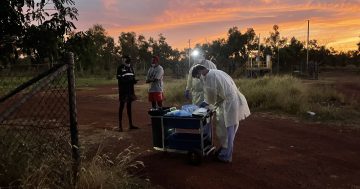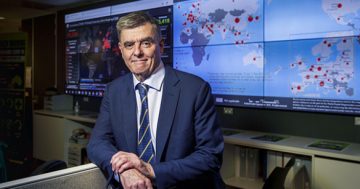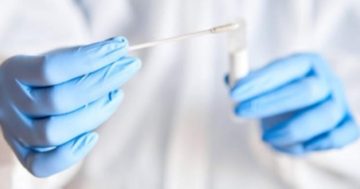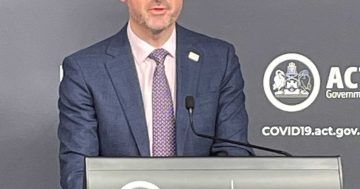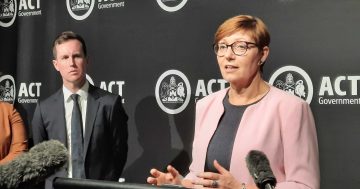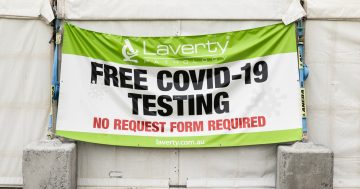Not so many people are seen using their anti-COVIT masks these days says Mary Gearin who asks whether that’s a good or bad sign.
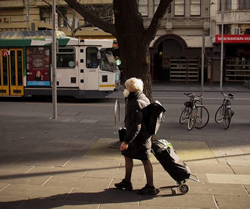 Go on, admit it … you’re not wearing your mask as much. If at all.
Go on, admit it … you’re not wearing your mask as much. If at all.
But you do sometimes work from home, and are more inclined to stay home if that sniffle is too obvious, even if you’re not automatically reaching for the RAT test.
Welcome to the post-mandate pandemic, where personal choice rules our risk-taking decisions.
Some of our 2020 habits have stuck around, but most have been ditched like old swabs.
But how many of those decisions are born of informed assessment, rather than fatigue?
And are health authorities getting the balance right, when choosing to either push messages onto a tired populace, or guard against ongoing risks?
‘I just sort of forgot about it’
In the bustle of Melbourne — the Australian city worst hit by the pandemic — Uttara candidly admitted she no longer wore a mask.
Her response was typical of those who stopped to speak to the ABC. Their rationales were revealing.
“No-one’s really wearing it on the train … so I just stopped as well. And I feel like I’m not seeing as much of it on the news and things like that,” Uttara said.
“I just sort of forgot about it.”
“John” didn’t want to give us his real name, but freely admitted he not only didn’t wear masks, but recently threw some out.
He’s not concerned about any ongoing COVID threat.
“It’s a bit out of sight out of mind — we’re not getting the stats every day,” he said.
High school student Jackson agreed: “I feel like it’s gone away a lot more.”
Seventy-four-year-old former police officer Chris, who was visiting from Western Australia, simply asserted the mask was “not necessary”.
“Do we wear a mask for everything? When somebody coughs, somebody sneezes? What the hell?” he said.
There’s got to be a limit to it somewhere. We can’t live in fear.”
Hopping off the tram without her mask, Yvonne Mauro summed it up simply. “I think we’re over the whole pandemic thing,” she said.
The search for a well-ventilated pub
There are some COVID habits many experts believe we can (relatively) safely let go.
If you’re not using sanitiser or washing your hands for 20 seconds, experts aren’t too fussed – at least when it comes to COVID risk.
Those measures were of a time, now passed, when we didn’t know the virus was airborne (although, of course, washing your hands is still recommended as a basic hygiene tool).
But while the data is still being collated, experts are so convinced we’ve forgotten our protective habits, including testing and reporting, that some models suggest the number of COVID infections is three times more than currently reported.
They’re also worried that we’ve failed to form new protective habits. For instance, are you checking out the air filtration measures at your local pub?
Three epidemiologists have told the ABC that would be the sort of “good habit” that we should have picked up, if we learnt anything from the pandemic.
Mike Toole knows the purifying air filters in his local pub well.
“[There’s] two as you walk in, two in the live music room, and one in the dining alcove. Plus a big courtyard. Now that is best practice,” he said.
Sure, he’s an associate principal research fellow at the Burnet Institute, but he said that’s the sort of research we should all be doing when we choose where to go out, particularly in winter.
The public health conundrum
Epidemiologist Nancy Baxter, who heads up the University of Melbourne’s School of Population and Global Health, said industry and government needed to do more to make workplaces and public spaces safer.
“We are unwilling to do active things to prevent transmission, so there needs to be a focus on passive things that can protect us,” Professor Baxter said.
“The bonus is this will help with transmission of all airborne disease. This needs to be a focus of occupational health and safety, and standards need to be set and enforced.”
An example of a missed opportunity for good habits in the workplace can be seen by taxi drivers who have returned to switching on the AC, rather than winding down the windows for ventilation.
Professor Toole said that habit was likely broken because the public doesn’t get any messages about the value of clean air.
He said the connection between our habits and the messages we get is actually the nub of the issue.
“Politicians are scared to speak out [due to pandemic fatigue], and the public don’t hear anything,” he said.
A ‘tricky’ balancing act for governments
University of Melbourne professor Tony Blakely, who’s now chair of a royal commission looking into New Zealand’s COVID response, said public health authorities and politicians were facing a conundrum.
“On the one hand, the population is tired of COVID. Public health authorities need to work out the pros and cons of pushing messaging now, versus saving up the stock of ’emergency’ response for when something takes off again,” he said.
“On the other hand, COVID-19 is now moving to endemic and a health risk similar to Influenza.
“Targeted messaging, at least, to the elderly, frail and the immunocompromised — to keep up to date with vaccines and mask up when with people outside the home — is important.
“Getting the balance right is tricky.”
Professor Toole went further and said the “feedback loop” between a fatigued public and their political leaders meant the public had been deprived of information it needed to assess risk.
“The public got tired. The government recognised that,” he said.
“[They thought] ‘Okay they’re tired, we won’t bother them anymore’. And then the government stopped talking, so the public got even more complacent.
“The cycle keeps going, so politicians are scared to speak out, and the public don’t hear anything, and think it’s all over.”
Counting the cost of the seventh COVID wave
In fact, Australia’s experiencing its seventh wave of COVID.
As of Friday, there were more than 1,800 people hospitalised with COVID-19 across the country.
Professor Baxter said she didn’t understand why people at substantial risk of COVID weren’t realising they remained at risk.
“I think that we’re having a problem with messaging,” she said.
Back on Melbourne’s streets, Barbara Champion said her “one wish” was for a return to the premier’s weekly or fortnightly COVID updates to the public.
“I think that we need to know the figures and we need to know that it still is with us,” she said.
Professor Toole said the public needed creative health campaigns like those designed to successfully reduce smoking, road fatalities and HIV.
“[Like] having a public health campaign, promoting the benefits of masks, just as we have very creative campaigns about road safety, smoking, HIV prevention. I haven’t seen that level of creativity.”
A federal health department spokesperson said a national campaign was being run across television, radio, press and social media channels.
“The latest Booster ‘Top Up’ media campaign aligns with the Australian Technical Advisory Group’s advice on immunisation and encourages people to consider getting a booster,” they said.
“The campaign also provides the Australian public with new information on eligibility (if you’re an adult and it’s been 6 months or more since your last COVID-19 vaccination or infection you can get a booster).”
Professor Blakely pointed to Taiwan as an example of a nation that ensured good habits stuck.
He said SARS 1 taught Taiwan the importance of making permanent changes around measures such as the use of masks, so that its population was “primed and ready” to adapt again when a new pandemic (SARS-CoV-2) arrived.
Professor Blakely urged Australia to make some “easy-to-do” changes, such as improving ventilation and boosting the vaccine uptake, to lower transmission of future COVID waves and any other respiratory viruses in years to come.
* Mary Gearin is an ABC News presenter and senior reporter. She’s a former Europe Correspondent, former National Sport Correspondent and has been the face of ABC coverage of global events from terrorist attacks in France and the Eurocrisis, to four Olympics and two Commonwealth Games. She has hosted Drive on ABC Radio Melbourne and co-hosted News Breakfast. She is based in Melbourne.


